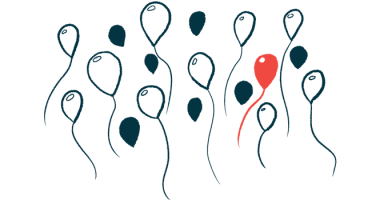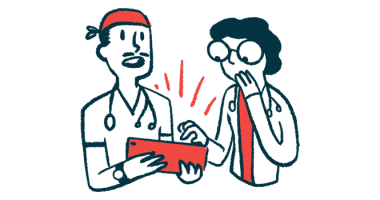You won’t disappoint anyone by taking care of yourself
With acute porphyria, I've had to unlearn the instinct to push my body

I don’t always know how my body feels upon waking. After acute porphyria symptoms went undiagnosed for years, I grew adept at dissociating from my pain. It’s how I survived.
However, one recent morning in Jackson, Wyoming, my body needed no introduction. Like the G-force of an accelerating airplane, my body pressed into the hotel bed with searing abdominal pain. It was far too intense to ignore. A break in the curtains sent a soft stripe of sunlight stretching from the plaid bedspread to the floor’s patterned Berber carpet. In an effort to distract myself, I traced the lines with my eyes and focused on my breath.
It was the first day of my family’s summer vacation out West, and acute hepatic porphyria (AHP) wasn’t part of the plan. I wasn’t supposed to be sick. In a few hours, I intended to share a raft with my family and paddle down the Snake River.
The mistake of pushing my body
I’ve been known to push through acute pain so as not to miss important events in the lives of friends and family. But it’s not a good idea. As the kids began to stir in the adjacent bed, I weighed my options: I could nap later, or maybe go to bed early tonight? At that point, I wasn’t willing to bail on my plans.
Too often my body has to scream to be heard.
I sat up slowly, and a hammer struck the front of my skull, blooming into a migraine. Quickly, I covered my mouth with both hands as my stomach seemed to fold into my throat. I felt the familiar urge to vomit.
“Go to breakfast without me,” I insisted, taking medicine and returning to bed. The chalky lump liquified on my tongue. I was grateful for a dark, cool room to rest in.
When the kids returned clutching the remaining halves of bagels, I still couldn’t get up. I had a few hours to recover before our rafting trip, and I slept until the very last minute.
Relearning how to care for myself
No matter how hard it is for me to get out of bed, there’s always a little voice in the back of my head telling me I’ll feel better after I shower or get dressed. This wishful thinking ignores my bodily cues and is a carryover from a time before I knew I had acute porphyria. Plenty of doctors gaslighted me, advising me to keep physically active, despite exhaustion or pain. They said too much rest would make my pain worse.
When it was time to leave for the rafting trip, I tried to clean up. Brushing my teeth in front of the mirror, I saw utter exhaustion behind my eyes. Seconds later, my head was in the toilet. Ready to leave and waiting on me, my partner peeked past the open bathroom door and was alarmed to find me on the floor, so ill.
Not only is it unhealthy for me to save face when I’m feeling unwell, it’s confusing for my loved ones. They want to be there for me when I’m struggling.
Recently, I canceled on a dear friend at the last minute due to side effects of a Panhematin (hemin for injection) infusion. Later, she confronted me about feeling hurt. “It makes me feel like you don’t trust me enough to be honest about how you’re feeling.” I saw her perspective. I’d been so concerned about admitting “weakness” and disappointing myself that I failed to consider the impact of my actions on the people I love most.
My family would’ve loved for me to join them on the river that day and were bummed I couldn’t. They know that spending hours in a dark hotel room by myself is the last thing I want to do on vacation. They also understand that I have to do what’s best to manage my rare disease. And honestly, the fact that my body needed a recovery day after a major elevation change and 17 hours in the car surprised no one.
I’ve been diagnosed with AHP for six years and still ignore my body’s cues — particularly if the flare occurs at an inconvenient time. A good little capitalist doesn’t have time to be chronically ill or take naps on a weekday afternoon. I know these habitual thought patterns are outdated, rigid, and unhelpful. Yet there remains a deep, internalized part of me that wants to do, achieve, and succeed at all costs.
These well-trodden pathways in my brain are a product of society, but I owe it to myself and others to challenge them. Because if I’m actively denying AHP’s impact on my life, how will I accept my body, or expect anyone else to?
Note: Porphyria News is strictly a news and information website about the disease. It does not provide medical advice, diagnosis, or treatment. This content is not intended to be a substitute for professional medical advice, diagnosis, or treatment. Always seek the advice of your physician or other qualified health provider with any questions you may have regarding a medical condition. Never disregard professional medical advice or delay in seeking it because of something you have read on this website. The opinions expressed in this column are not those of Porphyria News or its parent company, BioNews, and are intended to spark discussion about issues pertaining to porphyria.








Comments
Sandrea
Claire, thank you for sharing! I definitely can relate to the pushing through and hoping things will look up. It really does suck that it always gets us at the most inconvenient times. It's so very hard to not feel so guilty but, I'm thankful for the support I find in the AHP community.
Claire Richmond
I am too, the connection with others living with porpyria is the single most helpful thing for me to manage these uncertainties! Thanks so much for reading, Sandrea.
Katie
You really can't win in those situations. If you stay home in bed, which is best for you, others will be disappointed. If you drag yourself out to try to have fun and hope you'll feel better, you bring down everyone else, and exhaust yourself. They get tired of hearing complaints and cancellations, but if you don't complain, they forget you are coping with pain. Support from others in the same situation is incredibly helpful.
In the end, you have to do what is best for you! It can be a very lonesome path, but after nearly 30 years of it, I can tell you self-care pays off. I feel better now than I did 20 years ago!